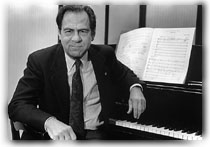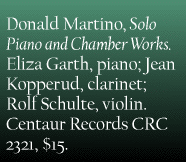Main Menu · Search ·Current Issue ·Contact ·Archives ·Centennial ·Letters to the Editor ·FAQs
 Martino: from Brahms to Bartók to Babbitt. Martino: from Brahms to Bartók to Babbitt. |
There should be a german word for the feeling that descends upon arriving at a recital to find a modern composition on the program--something like Schadenschoenalbanberg. It's a combination of fear and loathing that even serious classical music enthusiasts don't feel ashamed to express. Contemporary music can sound so insular, as though it had nothing to do with an audience; and this perceived snobbery leads to audiences dismissing the music out of hand. Part of the effort to stem this growing alienation must include recordings like pianist Eliza Garth's new compact disc of solo piano and chamber works by Bigelow professor of music emeritus Donald Martino.
This is the second recording of Martino's music that the Juilliard-trained Garth has produced, and a better introduction for listeners who don't know the range of Martino's oeuvre. (The first CD offers solo piano compositions, all later pieces, because Martino didn't write for solo piano during the eight early years that he apprenticed himself to the work of Béla Bartók.) Garth's fellow artists, violinist Rolf Schulte and clarinetist Jean Kopperud, are excellent. Schulte's slightly hysterical tone and flourishes are perfect for the violin sonata. This is an extremely vigorous performance, so much so that he can make Garth sound a little anemic by comparison. Also notable is Kopperud's warm and lilting performance of the clarinet sonata. Garth pairs better with Kopperud, but is still best solo: Martino's later pieces suit her well. Then her playing always sounds improvisatory and clever. 
The range of material on the CD is partly what makes it so fascinating. Martino's style has evolved through its own three Bs: Brahms, Bartók, and Babbitt. The Sonata for Clarinet and Piano (1951), though not so turbid as typical Brahms, is full of Brahmsian lyricism and sinuous musical lines. The Sonata for Violin and Piano, however, which was composed just one year later, is a clear nod to Bartók. It is full of defiance and earthiness: the violin sounds harsh double and triple stops, and the piano arrogantly tosses off dissonant chords and glissandos. These early pieces show Martino testing his limits compositionally.
Martino's mature style, influenced by his teacher at Princeton, Milton Babbitt, is something he calls "twelve tonal." It sounds both familiar and improbable. The Twelve Preludes and Impromptu for Roger (a piece written in honor of another of Martino's former Princeton teachers, Roger Sessions '15, Mus.D. '64), are full of what we think are clichés in serialist music: the spare plinks up and down the piano's register, a sudden dissonant chord, a fleeting pulse. In a process possibly akin to the phenomenon by which hostages begin to sympathize with their captors, I started to enjoy these pieces the more they rattled me. They are playful and teasing and give just enough hints of melodic line and musical gestures to make listeners confront questions about their musical expectations, and enjoy the process by which Martino thwarts them.
Because Donald Martino is considered one of the more accessible of the serialists--more than his peers might, he gives atonal music just enough surface tonality to orient listeners--his work could help you learn to enjoy that contemporary piece smuggled into the program (it's not going to go away). But you must do your homework. Start by getting this CD, because there is one word for it--in English, too: a pleasure.
~ Daniel Delgado